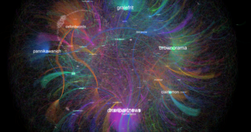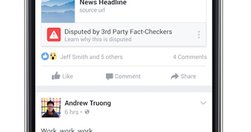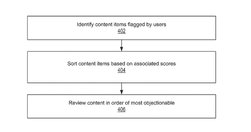Filter 1411 resources:
- disinformation (252)
- news (230)
- media (229)
- content strategy (194)
- social media (164)
- journalism (152)
- facebook (137)
- curation (135)
- storytelling (103)
- blogging (81)
- psychology (78)
- video (77)
- content (76)
- audiovisual (64)
- ai (61)
- community (61)
- native advertising (57)
- factchecking (55)
- us2020 (54)
- filter bubble (50)
- semantic (49)
- algorithm (49)
- tool (48)
- content marketing (48)
- blog (48)
- longform (47)
- cognitive (46)
- data journalism (39)
- bloggingportal (39)
- medium (39)
- eu (38)
- promotion (38)
- trump (37)
- audience research (36)
- productivity (35)
- design (35)
- twitter (33)
- multilingualism (32)
- science (32)
- trust (31)
- politics (31)
- podcast (31)
- visualisation (28)
- myhub (28)
- publicsphere (28)
- data (27)
- authenticity (26)
- augmented reality (26)
- innovation (25)
- visual (25)
- online architecture (24)
- covid19 (24)
- newsletter (24)
- seo (24)
- conspiracy (22)
- backfire effect (21)
- linkedin (21)
- communications (20)
- strategy (20)
- data visualisation (18)
- science journalism (18)
- google (17)
- realtime (17)
- explainer (17)
- mobile (17)
- science communication (17)
- enewsletter (17)
- polarization (16)
- bot (16)
- knowledge management (16)
- atprotocol (16)
- democracy (16)
- infographic (16)
- censorship (16)
- us (16)
- advertising (16)
- identity (16)
- comments (16)
- virtual reality (16)
- ux (15)
- delegitimise (15)
- information (14)
- interactive (14)
- metrics (14)
- crowdsourcing (14)
- stream (13)
- clickbait (13)
- messaging (13)
- engagement (13)
- gtd (13)
- personal (12)
- tv (12)
- bloggingportal2 (12)
- propaganda (12)
- digital transformation (12)
- fediverse (12)
- nytimes (12)
- post-truth (12)
- web design (12)
- confirmation bias (11)
- instagram (11)
- troll (11)
- llm (11)
- machine learning (10)
- 2ndbrain (10)
- persuasion (10)
- viral (10)
- gds (10)
- animation (10)
- k4p (10)
- russia (9)
- faq (9)
- business model (9)
- image (9)
- ec (9)
- newsroom (9)
- cms (9)
- atomisation (9)
- nlp (9)
- creativity (9)
- media literacy (9)
- domestic (9)
- brexit (9)
- (8)
- platform (8)
- marketing (8)
- evidence-based policy (8)
- cards (8)
- yanss (8)
- qanon (8)
- ea (8)
- instant articles (8)
- ocm (8)
- bluesky (8)
- livestream (8)
- 360video (8)
- information architecture (8)
- narratives (8)
- web (7)
- outreach (7)
- circa (7)
- editorial (7)
- app (7)
- pr (7)
- participation (7)
- top3pods (7)
- groupthink (7)
- organisation (7)
- privacy (7)
- cambridge analytica (7)
- event (7)
- bbc (7)
- vote (7)
- internal communications (7)
- search (7)
- html5 (7)
- regulation (7)
- buzzfeed (7)
- machine translation (7)
- blogpocalypse (7)
- startup (7)
- policy (6)
- bias (6)
- deep fake (6)
- antivaxxer (6)
- analytics (6)
- open web (6)
- theme (6)
- wikipedia (6)
- blogger (6)
- persona (6)
- chat (6)
- b2b4me (6)
- bestof2015 (6)
- web20 (6)
- suppress (6)
- slack (6)
- signaltonoise (6)
- sceptic (6)
- climate (6)
- collective intelligence (6)
- tribe (6)
- chatgpt (6)
- truth (6)
- vox (6)
- euractiv (6)
- screencast (5)
- obsidian (5)
- memory (5)
- blockchain (5)
- zettelkasten (5)
- hate (5)
- hoax (5)
- substack (5)
- decentralised (5)
- brand (5)
- vine (5)
- headline (5)
- gender (5)
- facebook live (5)
- usa (5)
- uk (5)
- basic (5)
- open source (5)
- google+ (5)
- sponsored content (5)
- europa (5)
- quartz (5)
- technology (5)
- framework (5)
- activitypub (5)
- knowledge visualisation (4)
- management (4)
- futurism (4)
- inoculation (4)
- blm (4)
- context (4)
- snapchat (4)
- responsive (4)
- collaboration (4)
- echo chamber (4)
- moderation (4)
- dissonance (4)
- gpt-x (4)
- solutions journalism (4)
- brussels bubble (4)
- youtube (4)
- presentation (4)
- credibility (4)
- europe (4)
- help (4)
- moments (4)
- optimisation (4)
- publishing (4)
- apple (4)
- influence (4)
- sublime (4)
- fbpaper (4)
- portal (4)
- education (4)
- ethics (4)
- magazine (4)
- corporate journalism (4)
- free speech (4)
- humour (4)
- bullshit (4)
- guardian (4)
- guide (4)
- tools (4)
- api (4)
- machine text (4)
- politicoeu (4)
- live (3)
- transparency (3)
- memex (3)
- outrage (3)
- meaning (3)
- writing (3)
- agile (3)
- rebelmouse (3)
- powerpoint (3)
- research (3)
- mvp (3)
- faceted search (3)
- gamification (3)
- change (3)
- paper (3)
- gif (3)
- themes (3)
- infowar (3)
- signal2noise (3)
- hr (3)
- misinform (3)
- ai prompt (3)
- history (3)
- ui (3)
- populism (3)
- expert (3)
- semanticweb (3)
- euractiv-com (3)
- campaign (3)
- debunk (3)
- survey (3)
- atprotocol lexicon (3)
- intranet (3)
- jeff jarvis (3)
- social marketing (3)
- personalisation (3)
- lobby (3)
- explanatory (3)
- multimedia (3)
- ai4communities (3)
- tourism (3)
- transmedia (3)
- andy matuschak (3)
- coda (3)
- wiki (3)
- disruption (3)
- roamresearch (3)
- eurosceptics (3)
- bundle (3)
- logo (3)
- blogactiv (3)
- automation (3)
- example (3)
- dunning-kruger (2)
- usability (2)
- project management (2)
- report (2)
- society (2)
- reality (2)
- fear (2)
- ngo (2)
- attentionweb (2)
- infopocalypse (2)
- china (2)
- computational propaganda (2)
- meme (2)
- risk (2)
- interface (2)
- culture (2)
- spambot (2)
- crowdfunding (2)
- mobocracy (2)
- desirability (2)
- pay4content (2)
- motivated (2)
- reflectivity (2)
- lean canvas (2)
- tumblr (2)
- comics (2)
- local (2)
- mastodon (2)
- wisdom (2)
- scicomm (2)
- crm (2)
- conference (2)
- law (2)
- hoaxy (2)
- share (2)
- library (2)
- trending (2)
- slideshow (2)
- authoritarianism (2)
- fomo (2)
- amp (2)
- copyright (2)
- notification (2)
- atlantic (2)
- counter speech (2)
- mooc (2)
- radio (2)
- slideshare (2)
- future (2)
- homepage (2)
- plagiarism (2)
- atavist (2)
- tag (2)
- pitch (2)
- keyword (2)
- buffer (2)
- training (2)
- nuzzle (2)
- river4 (2)
- seenthis (2)
- open science (2)
- australia (2)
- aggrefilter (2)
- iot (2)
- audio (2)
- meerkat (2)
- eparltv (2)
- goals (2)
- photography (2)
- scraping (2)
- planning (2)
- fivethirtyeight (2)
- mediafr (2)
- surveillance (2)
- drupal (2)
- taxonomy (2)
- usp (2)
- postmodern (2)
- skills (2)
- colour (2)
- backlink (2)
- social (2)
- mybot (2)
- curatorbot (2)
- osmo (2)
- learn (2)
- prezi (2)
- opencalais (2)
- ltinnovate2016 (2)
- bookmark (2)
- annotate (2)
- post-alpha (2)
- alpha phase (2)
- hosted (2)
- data4policy (2)
- balance (2)
- pluralistic ignorance (2)
- understanding (2)
- pink slime (2)
- flicc (2)
- product/market fit (2)
- sensemaking (2)
- euroblog (2)
- learning (2)
- syndicated-translation (2)
- excalidraw (2)
- massive.wiki (2)
- digital garden (2)
- mermaid (2)
- sari azout (2)
- whitewind (2)
- leaflet (2)
- rss (1)
- ios (1)
- freedom (1)
- citizen journalism (1)
- routine (1)
- slidecast (1)
- dark forest web (1)
- city (1)
- egov (1)
- digg (1)
- gmo (1)
- impact (1)
- economics (1)
- networking (1)
- binggpt (1)
- bioethics (1)
- freelancer (1)
- vr (1)
- genetic (1)
- nasa (1)
- conversation (1)
- glass (1)
- election (1)
- ep (1)
- react (1)
- game theory (1)
- lofi (1)
- spectacles (1)
- gov2.0 (1)
- rationality (1)
- streamplace (1)
- startupy (1)
- conversational (1)
- periscope (1)
- emily m bender (1)
- apathy (1)
- storyboard (1)
- roi (1)
- competition (1)
- cmv (1)
- version control (1)
- euro (1)
- raf (1)
- bingchat (1)
- adaptive content (1)
- compositional (1)
- hive (1)
- cardsort (1)
- trove (1)
- bard (1)
- hbr (1)
- eptv (1)
- ntopic (1)
- specialist (1)
- ello (1)
- liveblogging (1)
- ai-image (1)
- boredom (1)
- italy (1)
- wikileaks (1)
- shieldlaw (1)
- shortform (1)
- adobe (1)
- nsa (1)
- voice (1)
- fail (1)
- snowfall (1)
- “illusory (1)
- content partnership (1)
- truth psychology (1)
- yahoo (1)
- open government (1)
- homophily (1)
- abtesting (1)
- experiment (1)
- brain (1)
- biased assimilation (1)
- evolution (1)
- assimilation (1)
- happeningo (1)
- calendar (1)
- archive (1)
- ipad (1)
- reddit (1)
- length (1)
- cpms (1)
- rdf (1)
- linked data (1)
- ukraine (1)
- eeas (1)
- smo (1)
- physics (1)
- upshot (1)
- tabloid (1)
- cory doctorow (1)
- joan westenberg (1)
- mindhack (1)
- chinese (1)
- upworthy (1)
- philosophy (1)
- venue (1)
- python (1)
- negativity bias (1)
- enshittification (1)
- civil rights (1)
- seeding (1)
- expiration (1)
- governance (1)
- values (1)
- publicsector (1)
- consultancy (1)
- oecd (1)
- humility (1)
- template (1)
- geo (1)
- white papers (1)
- empathy (1)
- snowden (1)
- kickstarter (1)
- workflow (1)
- trello (1)
- game (1)
- chipotle (1)
- sovereignty (1)
- commonplace (1)
- european (1)
- newsana (1)
- newscred (1)
- muckread (1)
- pinterest (1)
- eurocrap (1)
- belgium (1)
- gpt-4o (1)
- storyful (1)
- letters2eu (1)
- mojo (1)
- supergirl (1)
- slow news (1)
- ideation (1)
- fascism (1)
- complex (1)
- napkin ai (1)
- public affairs (1)
- messenger (1)
- vlog (1)
- idpi (1)
- broadcast (1)
- co-creation (1)
- language technology (1)
- addiction (1)
- jobtodo (1)
- open data (1)
- ugc (1)
- primal (1)
- dell (1)
- stanbol (1)
- apache (1)
- embodiment (1)
- epale (1)
- multisite (1)
- anthropomorphic (1)
- rationalisation (1)
- programme (1)
- remote (1)
- pilot (1)
- roaming (1)
- eesc (1)
- chinese room (1)
- ifttt (1)
- diigo (1)
- video editing (1)
- google glass (1)
- dellhell (1)
- mindfulness (1)
- green (1)
- blogosphere (1)
- disgustology (1)
- data void (1)
- hololens (1)
- ebook (1)
- anthropocentric (1)
- schema.org (1)
- eu09vs19 (1)
- word2vec (1)
- scrollytelling (1)
- reversal curse (1)
- solr (1)
- micro.blog (1)
- posse (1)
- halo (1)
- indieweb (1)
- illusory (1)
- digital civility (1)
- interoperability (1)
- bookmarklet (1)
- elaboration (1)
- aspire (1)
- bluesky custom feeds (1)
- justin garrison (1)
- category (1)
- saas (1)
- framing (1)
- presseurop (1)
- neural link (1)
- gander (1)
- geofence (1)
- sociology (1)
- blackpr (1)
- free (1)
- cofoe (1)
- insurrection (1)
- yeats (1)
- comparison (1)
- threadapalooza (1)
- gatsby (1)
- storyline (1)
- team (1)
- circa2 (1)
- online (1)
- data portability (1)
- philippines (1)
- euvsdisinfo (1)
- it (1)
- syllabus (1)
- wikinews (1)
- web development (1)
- scarcity (1)
- omission (1)
- english (1)
- lobbying (1)
- honesty (1)
- imposter syndrome (1)
- sill (1)
- npr (1)
- meeting (1)
- goodwill (1)
- egovernment (1)
- eaststratcom (1)
- unreality (1)
- power (1)
- geopolitics (1)
- circuit-breaker (1)
- delusion (1)
- knowledge illusion (1)
- cui bono (1)
- peace data (1)
- information laundering (1)
- happiness (1)
- big data (1)
- false enforcement (1)
- ipr (1)
- intro (1)
- plandemic (1)
- yanns (1)
- design thinking (1)
- ginsburg (1)
- expertise (1)
- section230 (1)
- quiz (1)
- participatory culture (1)
- splinternet (1)
- fleeting (1)
- gab (1)
- planetary (1)
- scuttlebutt (1)
- trust net (1)
- hxc (1)
- map (1)
- early adopter (1)
- bridge (1)
- bridgit (1)
- wef (1)
- tiktok (1)
- define (1)
- wikitribune (1)
- spaced repetition (1)
- deplatform (1)
- ghost (1)
- mental health (1)
- discord (1)
- arg (1)
- plato (1)
- metaverse (1)
- label (1)
- flipboard (1)
- fedwiki (1)
- uncategorized (1)
- knowledge panel (1)
- fakebox (1)
- metaphor (1)
- polbot (1)
- truthbuzz (1)
- cluetrain (1)
- po.et (1)
- inscrutable (1)
- rebuttal (1)
- leadership (1)
- bxlsbbl (1)
- atproto adoption (1)
- lisp (1)
- yellow-card (1)
- psychometrics (1)
- specialised (1)
- journal (1)
- life-in-belgium (1)
- eparticipation (1)
- cosmik (1)
- information-architecture (1)
- compass news (1)
- laurens hof (1)
- comment (1)
- notion (1)
- reading queue (1)
- renee diresta (1)
- think (1)
- argdown (1)
- garden (1)
- knowledge graph (1)
- pkm (1)
- ontology (1)
- procrastination (1)
- 3p framework (1)
- radicalisation (1)
- ft (1)
- whatsapp (1)
- documentary (1)
- viber (1)
- apple news (1)
- upday (1)
- samsung (1)
- adblock (1)
- emergingus (1)
- sidewire (1)
- basecamp (1)
- webgl (1)
- 3d (1)
- line (1)
- syndication (1)
- business (1)
- peakbot (1)
- d3 (1)
- music (1)
- speech to text (1)
- smartcities (1)
- autonomous (1)
- transcript (1)
- bitcoin (1)
- text (1)
- agora (1)
- cx (1)
- assist (1)
- mixed reality (1)
- storymapjs (1)
- monetisation (1)
- flancian (1)
- feed (1)
- partnership (1)
- middleware (1)
- longreads (1)
- mediumform (1)
- filter (1)
- theoretical physics (1)
- einstein (1)
- dikw (1)
- statistics (1)
- agriculture (1)
- twitter migration (1)
- integrated (1)
- essena (1)
- liquid democracy (1)
- europcom (1)
- service (1)
- experience (1)
- wapo (1)
- mapping (1)
- autosummarise (1)
- polls (1)
- playbook (1)
- soonfeed (1)
- perplexity.ai (1)
- trade (1)
- user (1)
- guidelines (1)
- eurosceptic (1)
- pressrelease (1)
- fuego (1)
- nat eliason (1)
- listicle (1)
- semble (1)
Relevant Overviews
- Communication Strategy
- Content Strategy
- Online Strategy
- Online Community Management
- Social Media Strategy
- Content Creation & Marketing
- Digital Transformation
- Thinking tools
- Innovation Strategy
- Communications Tactics
- Psychology
- Social Web
- Media
- Politics
- Communications Strategy
- Science&Technology
- Business
Overview: Content Strategy
Are you creating the content your audience actually wants to consume, or are you just talking about yourself?
What sort of content will your audience read, out of the endless supply at their fingertips? Formal news articles or blog posts from your staff and readers? An event calendar updated daily, or a longread every month? Static web pages, or a deeply granular database with faceted search?
And have you figured out how to get it to them, develop engagement around it, and translate that success into something concrete, fulfilling your mission? How many of the friends and organisations in your network amplify your message regularly?
Need answers? Get in touch.
More services: start with Communication strategy.
Relevant resources
Forty-four percent of people shown a native ad couldn’t correctly identify the company that had paid for it... 54% ... indicated that they had felt deceived by native advertising before. And 77% ... didn’t even identify native ads as “advertising... I guess they co-created it, so I guess maybe that’s not an ad.”

many consumers perceive them as scams because they don’t understand that the message/post is actually paid for by the brand... the buyer feels betrayed. This reflects poorly not only on the brand but the publisher as well... The only technique ... is marking native ads. However, due to the very nature of these units, the ‘markings’ are very subtl…

It’s easier than ever to spread misinformation.... social media tools are, after all, just that: tools.... fake news has been with us, in different guises, since long before anyone ever had the chance to tweet it.

... no one has direct access to reality. The real world is nearly impossible to see in this maelstrom ... because human minds need to “construct” their own version of reality — and each of us does this within a community of shared experiences and beliefs... there are many social worlds and each is built on its own version of what is real and true.…

the idea that fake news was central to the outcome of the campaign has little basis in fact... it’s mostly likely to be shared by people who have already bought into a partisan or ideological worldview... Clinton’s campaign ... problem was ... coverage that dwelled overwhelmingly on a bullshit email server scandal, devoted far fewer resources to…

if publishers disagree with their labels they’ll have to take it up with the third-parties... won’t receive any payment from Facebook, but may get a traffic and branding boost from the debunk post links... Facebook is still working on better classifiers to automatically detect fake news, and preventing fake news from appearing as “Related Article…

Mantzarlis expects the partnership will result in a huge increase of applications to sign on to the IFCN’s code.... leads to a surge in genuine fact-checking projects, so much the better... Facebook decides which fact-checkers to include; the IFCN code is just the ‘minimum condition...

Here’s a look at the challenges facing each of Zuckerberg’s specific ideas... The technology to identify blatantly false news exists — the real question is what Facebook will choose to do with the content it categorizes as “misinformation.”... Relying on third-party fact checkers could lessen scrutiny on Facebook’s verification process and give …

Facebook ... cannot — act as The Great Editor... It passes that task on to outside entities.... If Facebook is going to pay for video, it might want to consider paying for truth, which is also good for business... I would also like to see Facebook share data about how lies spread and what motivates people to reconsider before sharing lies so resea…
Users will be able to mark stories as fake...algorithm will look at whether a large number of people are reporting a particular article, whether or not the article is going viral, and whether the article has a high rate of shares... create an algorithm-vetted set of links that then goes on to a team of researchers within Facebook... links are sent…

Broadsides against fake news amount to a rearguard action from an industry fending off competitors who don’t play by the same rules... an independent, powerful, widely respected news media establishment is an historical anomaly... Fake news is but one symptom of that shift back to historical norms... Just as Watergate gave the media a bright stor…
Asked who should tackle the problem, respondents gave about equal weight to government, tech companies such as Facebook and Google, and the public... The term “fake news” is fuzzy... disinformation, propaganda, conspiracy-mongering or ... “very biased takes on public affairs”Eli Pariser... online clearinghouse for potential solutions... All of the…

A work in progress from an upcoming eponymous post. Another experiment with the enewsletter format: some initial thoughts on this seemingly intractable problem, with some of the source materials I’m studying.

An MP blaming his own failings ... on evil Russians ... without a slither of evidence. Post-truth much? ... Remainers cannot accept that a majority of people are simply rationally opposed, to ... the EU.... he’s so stunned that there are people out there who think differently to him that the only way he can make sense of it is by imagining thes…

When someone tries to correct you... it backfires and strengthens those misconceptions ... the backfire effect makes you less skeptical of those things that allow you to continue seeing your beliefs and attitudes as true and proper... exerting effort dealing with the cognitive dissonance produced by conflicting evidence, we actually end up buildin…

Let’s start with a broad definition of “fake news” as information... that then proves unverifiable or materially incorrect... used to be called propaganda. And there is an extensive social science literature on propaganda... How does mainstream journalism that is also clearly politically biased – on all sides – claim the moral high ground? ... “f…

Echo chambers aren’t just a product of the internet and social media, however, but of how those things interact with fundamental features of human nature... Understand these features of human nature and maybe we can think creatively about ways to escape them... our tendency to associate with people like us. Sociologists call this homophily.... t…

Not only is Facebook not providing little red warnings along with links to potentially specious news—it’s now blocking links to the plugin that did... . “It would seem I’ve caused them some embarrassment by showing them to be full of bull when it comes to their supposed inability to address fake news and they are punishing me for it.”... Update #…

Facebook’s application for Patent 0350675: “systems and methods to identify objectionable content.” ... filed in June 2015, describes a sophisticated system for identifying inappropriate text and images and removing them from the network... improve the detection of pornography, hate speech, and bullying... much easier to identify than false news s…

The brain ... is an “inference generating organ.” ... predictive coding, according to which perceptions are driven by your own brain and corrected by input from the world... When “the sensory information ... does not match your prediction... you either change your prediction—or you change the sensory information that you receive.” We form our bel…

fake news wouldn’t be a problem if people didn’t fall for it and share it. Unless we understand the psychology of online news consumption, we won’t be able to find a cure... online news readers don’t ... care about the importance of journalistic sourcing ... “professional gatekeeping.”... I mocked up a news site and showed four groups of partici…

For a term that is suddenly everywhere, “fake news” is fairly slippery... government propaganda designed to look like independent journalism... any old made-up bullshit ... a hoax meant to make a larger point... only ... when it shows up on a platform like Facebook as legitimate news? What about conspiracy theorists ... satire intended to entertai…

What we need today is metaliteracy – an ability to make sense of the vast amounts of information in the connected world of social media... educators and policymakers must “demonstrate the link between digital literacy and citizenship.” ... Metaliterate individuals ... learn to carefully differentiate among multiple sites... question the validity o…

psychological science suggests that exposure to false news would have an impact on people’s opinions and beliefs... repeated exposure to false information can change people’s beliefs ... phenomenon is called the “illusory truth effect.”... simply repeating false information makes it seem more true... prior knowledge does not protect people from …
Scottie Nell Hughes ... drove a stake into the heart of knowable reality: “There’s no such thing, unfortunately, anymore, of facts... So, how should Trump’s statements during the campaign have been covered? Should reporters have added something like this in the second paragraph of every news story? “Trump probably didn’t mean that he would appoin…

Tech companies may face new legislation after struggling to comply with voluntary code of conduct... Under a code of conduct announced in May, Facebook, Twitter, Google, and Microsoft agreed to review and respond to “the majority” of hate speech complaints within 24 hours

There’s large-scale, statistically significant research into the impact of search results on political views... Google is doing a horrible, horrible job of delivering answers here. It can and should do better... people are finally saying, ‘Gee, Facebook and Google really have a lot of power’ like it’s this big revelation. And it’s like, ‘D’oh.’”…

Major enterprise stories — stories that take deep dives and attempt to inform readers in substantive ways or to elicit impact... require considerable resources... the potential audience is limited... how can journalists get readers to complete these long pieces?use multiple elements and platforms to tell the story... the parts that pull your reade…

Propaganda warfare is increasingly shaping narratives, policies and lives around the world.
We have ideas for sponsored Codas, that are of interest to specific groups.
Loading more...
Relevant Overviews
- Communication Strategy
- Content Strategy
- Online Strategy
- Online Community Management
- Social Media Strategy
- Content Creation & Marketing
- Digital Transformation
- Thinking tools
- Innovation Strategy
- Communications Tactics
- Psychology
- Social Web
- Media
- Politics
- Communications Strategy
- Science&Technology
- Business